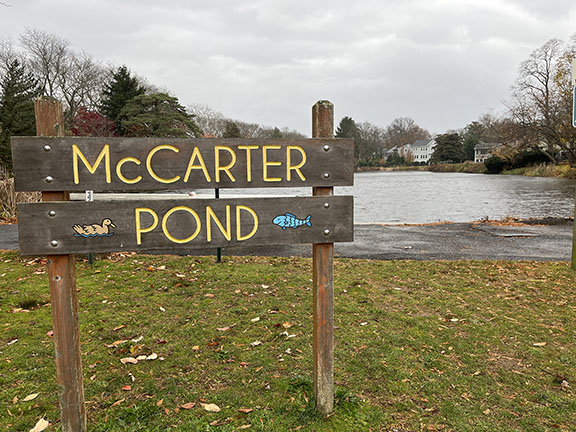
By Sunayana Prabhu
FAIR HAVEN – Ensuring the viability of McCarter Pond is a regular concern for the borough council. Now an alternative to dredging may hold the answer to keeping the pond healthy.
During a regular meeting Nov. 28, the council awarded a contract in the amount of $153,890 to South Kearny-based Spectraserv from the borough’s capital improvement funds for hydro-raking, a process similar to dredging that is more cost-effective and less ecologically disruptive.
Nearly 4 feet deep, the man-made pond was built on the McCarter estate in the early 20th century by owner Thomas Carter (1867-1955) for ornamental and recreational purposes. Since then, it has evolved into a landmark in the borough and part of its identity. Located between Fair Haven Road and Buttonwood Lane, it is popularly known as an intergenerational, recreation spot for Fair Haven families featuring ice skating and hockey games in the winter and is the site of the borough’s annual fishing derby in the spring.
Over the years, residents – as well as the borough’s environmental commission – have been concerned about the pond’s overgrown vegetation and abundance of silt that risks endangering the aquatic life.
Although the borough treats the pond with environmentally friendly chemicals to help kill duckweed and other vegetation, excessive silt from the vegetation sinks to the bottom and decays, creating a natural progression for the manmade pond to return to the meadow it used to be.
The borough considered dredging the pond “probably 15 years ago but ultimately decided not to do it for a variety of reasons,” Theresa Casagrande, borough administrator, told The Two River Times. Hydro-raking is a relatively new technology. “It wasn’t done years ago because it wasn’t available years ago,” she said. Casagrande noted that there are other ponds throughout New Jersey that have utilized this technique very successfully.
Both hydro-raking and dredging remove aquatic vegetation and its root systems before it has a chance to decompose and become muck on the bottom of the pond, decreasing depth over time. But dredging aggressively removes everything – vegetation, root structures and organic matter – and disturbs the water, while hydro-raking is “a more selective and holistic management approach,” according to Solitude Lake Management (SLM), an aquatic consulting company. “Dredging is heavily focused on both organic and inorganic sediment removal to restore pond depth,” SML’s website reads, while hydro-raking’s removal process allows aquatic life to survive.
The hydro-rake sits on a floating barge with a hydraulic arm and rake attachment. It can operate in water depths from 18 inches to 10 feet.
“Hydro-raking can be an effective alternative to herbicide and algaecide applications,” according to the State of Florida Property Management Association, “but it has also proven effective in unison with these treatments.” Also, the organization notes, “if a lake or pond is periodically maintained through hydro-raking, the need to perform a large scale dredge project may be negated, saving financial resources and prolonging ecological disruption in the process.”
Hydro-raking of McCarter Pond is expected to start in December and “anticipated to be done no later than the early spring,” Casagrande said. “The mayor and council are very pleased that this project is moving forward. Very pleased to be investing capital funds in a beloved landmark in Fair Haven.”
The article originally appeared in the December 1 – 7, 2022 print edition of The Two River Times.














